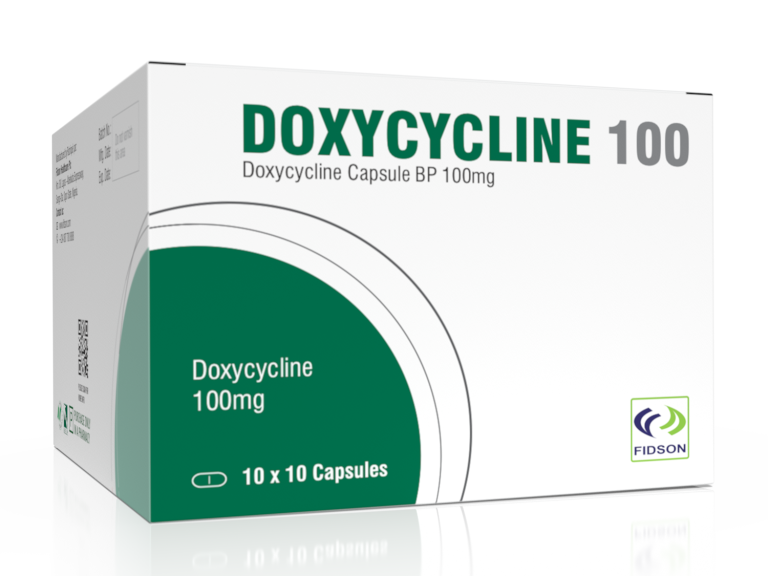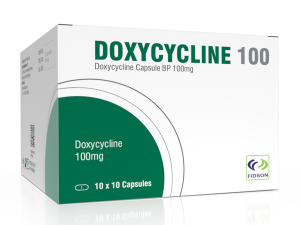Read this leaflet carefully before you start taking this medicine. (DOWNLOAD)
DESCRIPTION
Doxycycline, a tetracycline is a broad spectrum antibiotic exhibiting bacteriostatic properties against a broad spectrum of bacteria and also has some antiprotozoal property.
CLINICAL PHARMACOLOGY
It exerts its antimicrobial action by binding reversibly to the ribosomal units thereby inhibiting the bacterial protein synthesis. It is readily and almost completely absorbed from the Gastrointestinal tract with peak plasma concentration occurring at 11/2 – 4 hours. It is excreted in the urine and in the faeces.
ANTIMICROBIAL ACTION
Doxycycline is active against a broad spectrum of Aerobic and Anaerobic pathogenic bacteria, Chlamydiae, Mycoplasma, Rickettsias, Spirochaetes, and some Protozoa
SPECTRUM OF ACTIVITY:
- Gram Positive organisms namely Cocci including; Strains of Staphyloccocus aureus,Streptococci; Str. pneumoniae, Str. pyogenes, Viridans streptococci, Strains of Actinomyces israeli, Bacillus anthracis, Listeriae monocytogenes, Anaerobes including Clostridium spp and Norcadia spp.
- Gram negative organisms namely Cocci including Nesseria meningitides, N. gonorrhea and Moraxella(Branhamella)catarrhalis, Bordetella pertussis, Brucella spp, Haemophilus influenzae, some strains of Haemophilus ducreyi, Anaerobes such as Bacteroids fragilis.
- Other organisms include Helicobacter pylori, Chlamydia spp, Rickettsia, Coxiella spp, many Spirochaetes including Borrelia burgdorferi and Treponema pallidum.
- Some protozoa namely Plasmodium falciparum and Entamoeba histolytica.
INDICATION
Doxycycline is indicated in the treatment of a large number of infections caused by susceptible organism such as;
- Infections caused by Rickettsia including ehrlichiosis, Typhus, Spotted fevers, Trench fever and Q fever
- Infections caused by Chlamydia including psittacosis,Trachoma, non-gonococcal urethritis,Pharyngitis and Pnuemonia due to Chlamydia pneumoniae
- Infections caused by Mycoplasma especially pneumonia caused by Mycoplasma pneumoniae.
- Treatment of Cholera
- Oral treatment of Acne and Rosacea
- In the treatment of Gonorrhea in patient allergic to Penicillin
- In Chemoprophylaxis of Malaria
- Prophylaxis for diarrhoea caused by enterotoxigenic Escherichia coli.
SIDE / ADVERSE EFFECT
Gastrointestinal disturbances including Nausea, vomiting and diarrhoea, Dry mouth, Glossitis, Discolouration of the tongue, Stomatitis, Dysphagia, Hypersensitivity reactions including Rashes, exfoliative dermatitis, Urticaria and Asthma. Rare effects observed include Haemolytic anaemia, Eosinophilia, Neutropenia and Thrombocytopenia.
DOSAGE /ADMINISTRATION
Adults:
- Infections caused by Sensitive organisms;
100mg P.O 12hours 1st Day, 100mg P.O daily.
- Gonorrhoea in patients allergic to penicillin;
200mg P.O initially, followed by 100mg at Bedtime, then 100mg twice
for 3days.
- Non Gonococcal Urethritis;
100mg P.O twice daily for at least 7days.
- Traveller’s Diarrhoea caused by Escherichia coli;
100mg P.O daily
- Chemoprophylaxis for Malaria;
100mg P.O once daily
FOR CHILDREN
PRECAUTION
Doxycycline is used with caution in patients with impaired renal function and hepatic function. Also in patients with Myasthenia gravis.
WARNING
Doxycycline should be taken with sufficient fluid (at least half a glass of water), in an upright position and an hour before retiring to bed to prevent oesophageal ulceration.
Doxycycline should not be taken with preparation containing Aluminium, Magnesium, Calcium and Iron for example Antacids, Iron preparations, Milk and Dairy products.
CONTRAINDICATED
Doxycycline is contraindicated in
- Patients with known hypersensitivity to any Tetracycline;
- During pregnancy and Lactation;
- In children under age 8 because of the risk of permanent discoloration of teeth, enamel defects, and retardation of bone grow.
STORAGE
Store in an airtight container, protected from light
Keep all medicines out of the reach of children.






